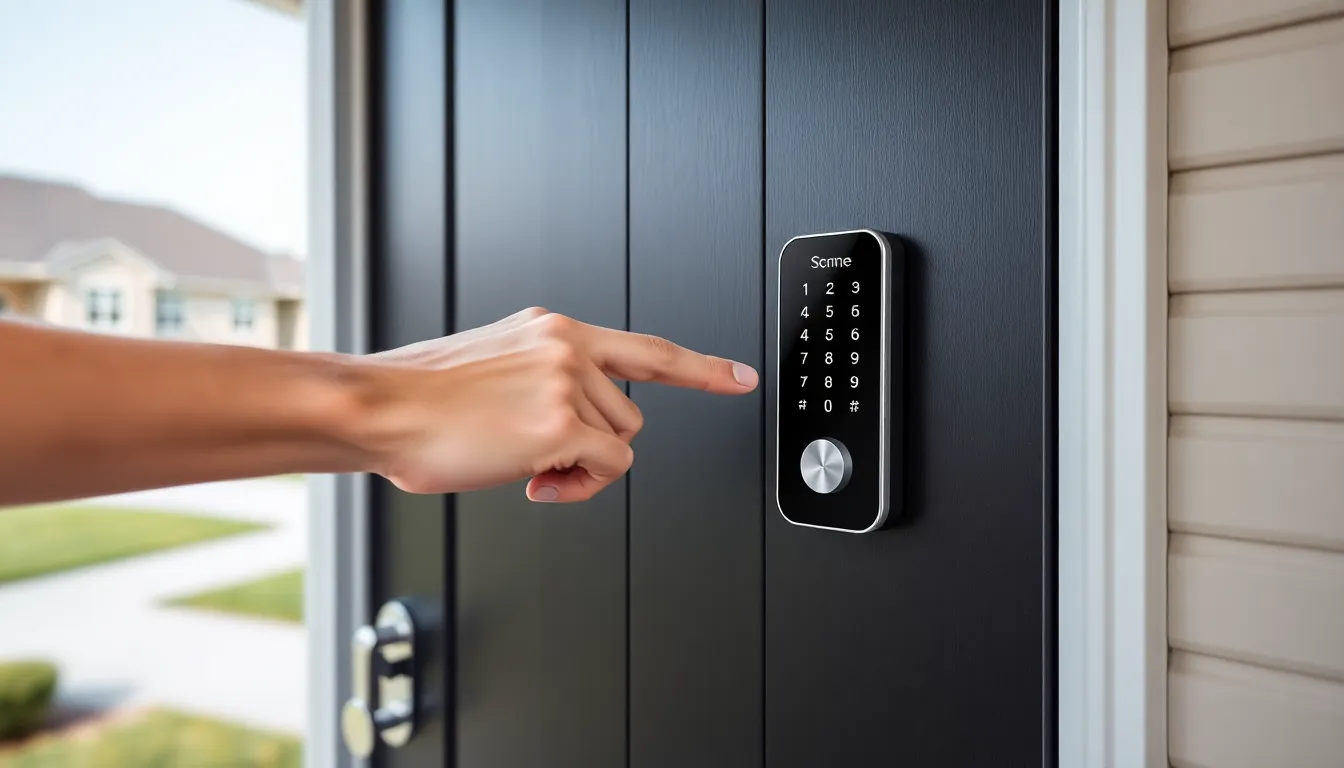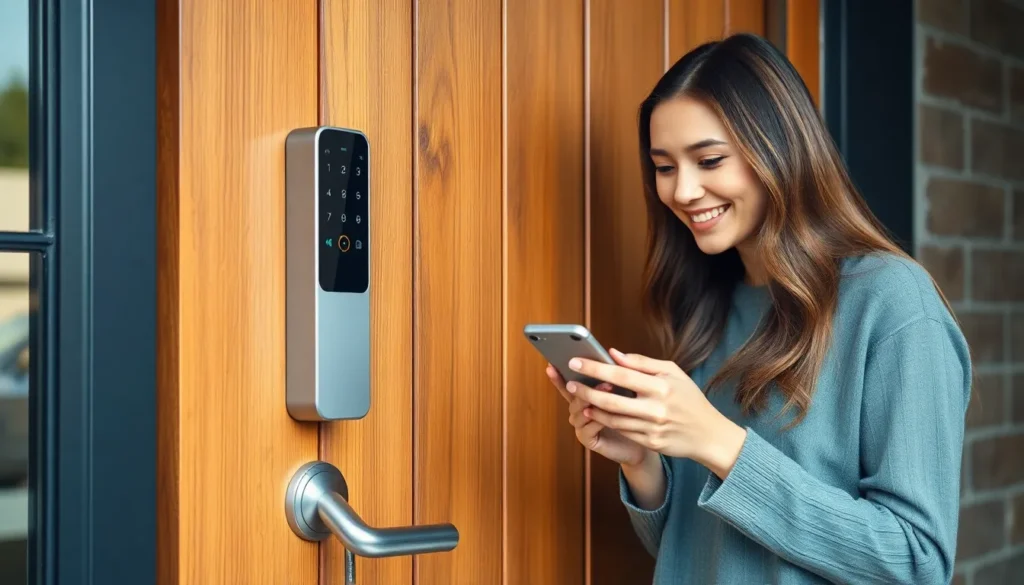In an age where convenience and security go hand in hand, smart locks are revolutionizing how people protect their homes. These innovative devices combine cutting-edge technology with user-friendly features, allowing homeowners to control access with just a tap on their smartphones. Gone are the days of fumbling for keys or worrying about lost ones.
Smart locks offer a range of benefits beyond traditional locking mechanisms. With options for keyless entry, remote access, and integration with home automation systems, they provide peace of mind and flexibility for modern lifestyles. As more individuals seek to enhance their home security, understanding the advantages and functionalities of smart locks becomes essential.
Table of Contents
ToggleOverview of Smart Locks
Smart locks represent a significant advancement in home security technology. These devices offer keyless entry, enabling homeowners to unlock doors without physical keys through smartphones, key fobs, or biometric identity verification. Smart locks integrate with smartphones via Bluetooth or Wi-Fi, allowing for real-time control and monitoring of door access from anywhere.
Smart locks enhance convenience through features like remote access management. Homeowners can grant or revoke access to guests, service providers, or delivery personnel directly from their mobile devices. Additionally, many smart locks support home automation systems, enabling users to coordinate with other smart devices, like security cameras and alarms.
Security is a core benefit of smart locks. These devices often feature encryption protocols, making unauthorized access difficult. Alerts notify homeowners in case of suspicious activities, providing peace of mind. The ability to generate temporary access codes further enhances security, as it allows guests to enter without sharing permanent access codes.
Modern smart locks vary in design and functionality, catering to different security needs and preferences. Some models include advanced features such as geofencing, which automatically unlocks the door when the homeowner is nearby, while others may offer voice command integration with virtual assistants. Understanding these features can help homeowners choose the most suitable smart lock for their lifestyles.
Benefits of Smart Locks

Smart locks offer numerous advantages that enhance both security and ease of use for homeowners. Understanding these benefits can help individuals appreciate their importance in modern home security systems.
Enhanced Security Features
Smart locks incorporate advanced security measures that significantly improve traditional locking systems. Most smart locks utilize encryption protocols to protect user data and communications. They also feature alerts for unauthorized access attempts, allowing homeowners to respond promptly to threats. Biometric verification methods, like fingerprint scanning, add another layer of protection by ensuring that only authorized users can gain entry. Additionally, the ability to generate temporary access codes for guests or service providers minimizes the risk associated with lost or stolen keys.
Convenience and Accessibility
Smart locks provide exceptional convenience and accessibility for homeowners. Keyless entry through smartphones, key fobs, or biometric means eliminates the hassle of carrying physical keys. Remote access capabilities enable users to lock or unlock doors from anywhere, making it easy to grant entry to visitors or service providers without needing to be home. Many smart locks also support integration with home automation systems, allowing users to streamline various security functions, such as scheduling automatic locking and unlocking times. This level of control aligns perfectly with the busy lifestyles of modern homeowners.
Types of Smart Locks
Smart locks come in various types, each offering unique features to enhance security and convenience. Understanding these types assists homeowners in choosing the right smart lock for their needs.
Keypad Smart Locks
Keypad smart locks enable entry through a numeric code. Users enter the code on a built-in keypad, allowing for keyless access. These locks often support multiple codes, enabling families to create unique access codes for different users. Some models include backlit keypads for nighttime visibility.
Biometric Smart Locks
Biometric smart locks use fingerprint recognition technology for authentication. These locks scan and store fingerprints, providing an added layer of security. Users benefit from quick access as they simply place a finger on the scanner. Many biometric models include backup keys or numeric keypads as alternatives.
Bluetooth and Wi-Fi Smart Locks
Bluetooth and Wi-Fi smart locks allow smartphone connectivity for remote access management. Bluetooth models facilitate unlocking via nearby devices while Wi-Fi models enable control from anywhere with internet access. Users can monitor door status, receive alerts, and grant access in real-time. Some Wi-Fi locks include compatibility with home automation systems, enhancing overall smart home integration.
Installation and Setup
Smart locks typically offer straightforward installation options, catering to different user preferences and skills. Understanding installation methods is crucial for optimal functionality.
DIY Installation vs. Professional Installation
DIY installation of smart locks generally involves several simple steps: removing the existing lock, fitting the smart lock, and syncing it with a smartphone. Many smart locks come with installation kits and detailed instructions, making them accessible for the average homeowner. Options like keypad and Bluetooth smart locks often emphasize user-friendly installation.
Professional installation provides advantages in terms of assurance and expertise. Licensed locksmiths guarantee proper setup, ensuring the lock functions seamlessly with existing door hardware. They typically account for specific door types and conditions, which can optimize security features. Choosing a professional might be ideal for more complex systems, such as those incorporating multiple user access or home automation compatibility.
Compatibility with Existing Door Hardware
Smart locks vary widely in compatibility with existing door hardware. Most locks fit standard residential doors, commonly using the same hole sizes and placement as traditional locks. However, specific models may require adjustments, such as a new deadbolt or a different latch mechanism.
Homeowners should check the specifications of their smart lock against their current hardware before purchasing. Many manufacturers provide compatibility guidelines that detail suitable door types, thicknesses, and security system integration. Compatibility ensures efficient operation and extends the lifespan of both the smart lock and the door it secures.
Challenges and Considerations
Smart locks, while offering convenience and advanced security features, come with several challenges and considerations that homeowners should address.
Battery Life and Maintenance
Battery life is crucial for smart locks. Most models rely on batteries that require periodic replacement, typically every 6 to 12 months, depending on usage and lock model. Smart locks often include battery level notifications via mobile apps, alerting users when battery life runs low. Regular maintenance involves checking these notifications and ensuring batteries are replaced promptly to avoid unexpected lockouts. Homeowners should also consider backup options, including keys or alternative entry methods, in case of battery failure or maintenance needs.
Cybersecurity Risks
Cybersecurity risks present significant concerns for smart lock users. Hackers may exploit vulnerabilities in the lock’s software or wireless communication protocols. Smart lock manufacturers continuously update their firmware to address these threats, making regular updates essential for maintaining security. Homeowners should choose locks from reputable brands with strong security features, such as encryption and two-factor authentication, to reduce risks. Implementing a strong, unique password for any associated smartphone apps further enhances protection against unauthorized access. Regular security audits of smart home networks also help identify weaknesses that could be exploited.
Smart locks represent a significant advancement in home security technology. They offer unparalleled convenience and peace of mind for homeowners seeking to enhance their security measures. With features like keyless entry and remote access management, these devices simplify everyday life while ensuring robust protection against unauthorized access.
As homeowners increasingly prioritize security and convenience, smart locks are becoming essential tools in modern living. By understanding their benefits and potential challenges, individuals can make informed decisions that align with their lifestyle and security needs. Investing in a smart lock not only boosts home security but also embraces the future of home automation.






